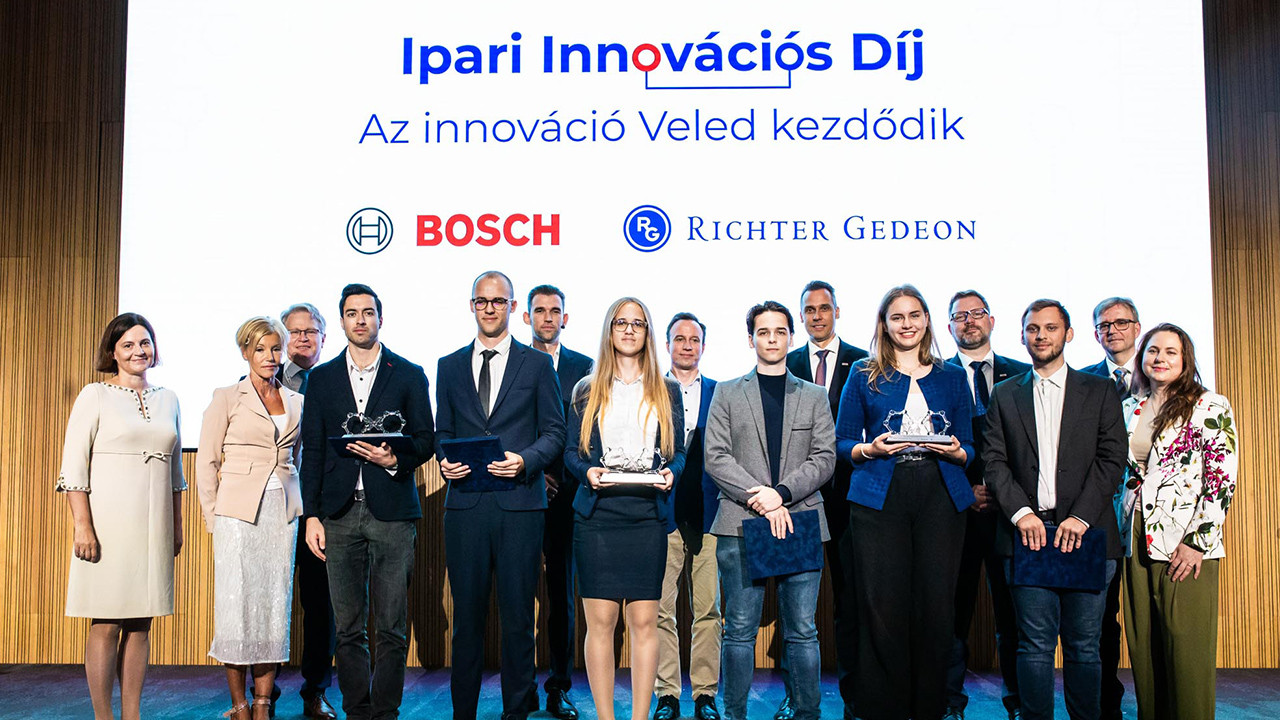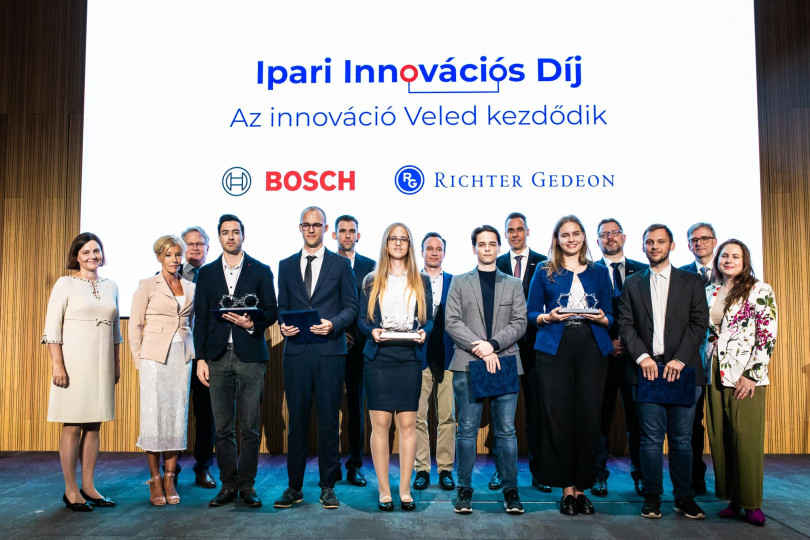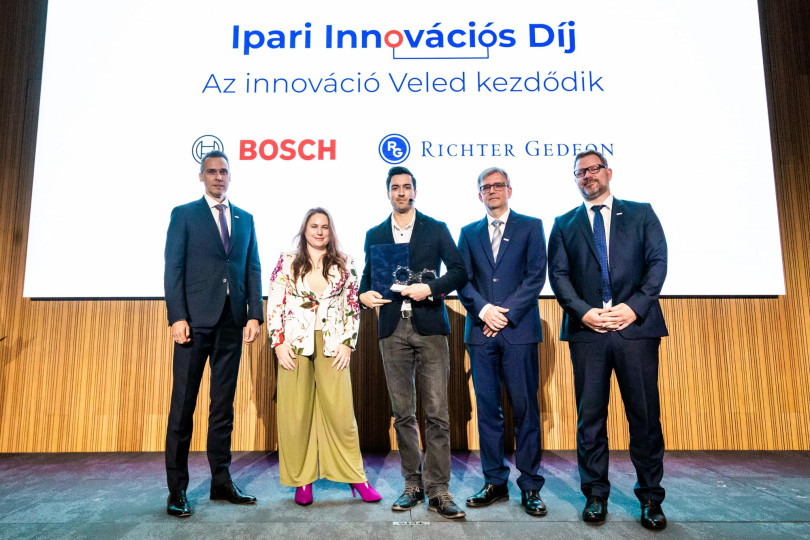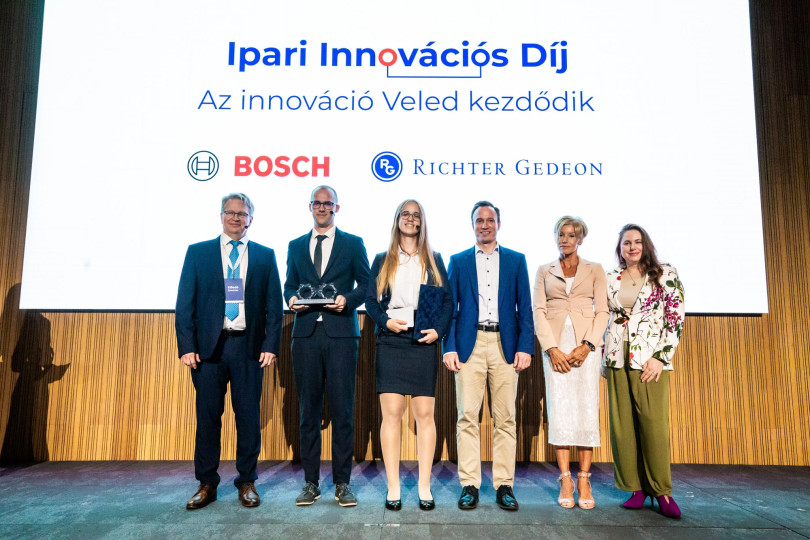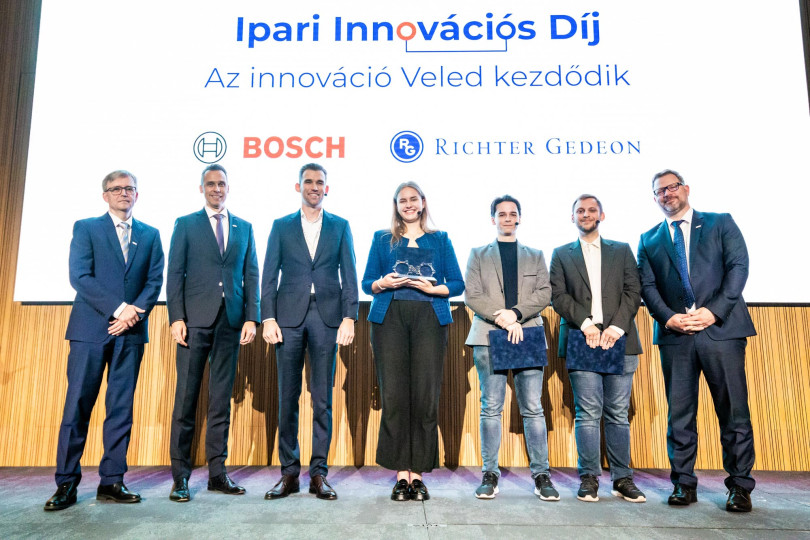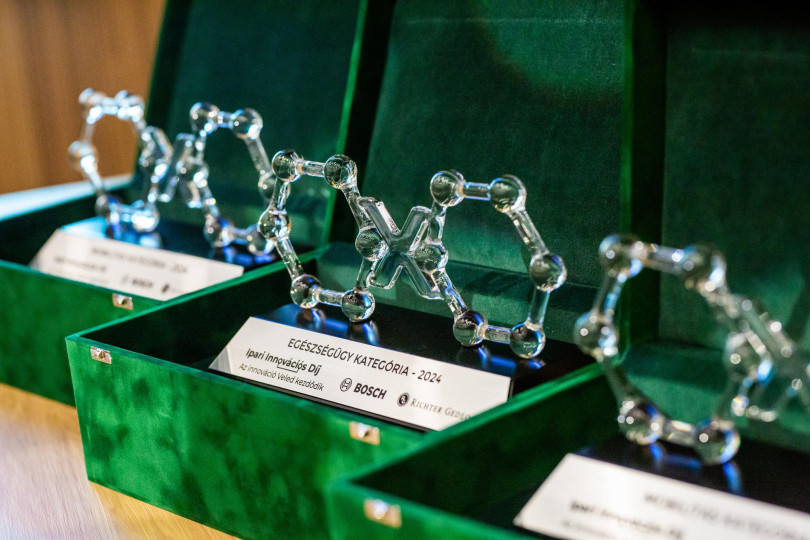Budapest – The Bosch×Richter Industrial Innovation Awards, which were launched for the first time in spring 2024 by two of Hungary’s leading innovative companies for students in higher education, recognized the visionary ideas of Generation Z young people.
The aim of the competition was to encourage young people to think innovatively and develop sustainable solutions for the future. They were looking for marketable ideas that respond to real problems in our daily lives and that could help make the future of transport and healthcare more sustainable and efficient, helping people’s lives. Students were invited to submit their proposals in individual or team categories on the themes of health or mobility.
Of the many valuable entries, the jury decided that the Bosch×Richter Industrial Innovation Award was this year awarded to three entries that addressed the problem of urban heat islands, the treatment of dementia and the expansion of self-driving technology. The winners were honored at the second Bosch×Richter Innovators’ Day at the Bosch Budapest Innovation Campus, where the winners presented their entries to the participants.
Oasis in the city: a cooling passenger pavilion in the summer heat
“This year we probably had the coolest summer of the rest of our lives,” said Ádám Teket, a graduate of the Moholy-Nagy University of Art and Design, at the Bosch×Richter Innovators’ Day, introducing his winning entry. “The increasingly intense summer heat waves are a constant challenge for all of us,” he added. The urban heat islands that form on densely built-up surfaces with artificial coverings are literally one of the hot topics of our time, and they are being tackled by the ‘Urban Oasis 2030’ system of passenger shelters. The versatility of the idea is that the concept, which uses only passive and very low energy-consuming cooling technologies, can be placed anywhere in the urban concrete jungle as a resting point for cooling oneself. In the unbearable heat, it can be a refreshing and green solution for cooling and shading, this unusual structure can be a lifesaver for city dwellers in the heat. This innovation not only aims to improve our everyday well-being, but also considers the long-term health and ecological consequences of climate change. Moreover, sustainability is not only captured in the function and operation of the modular pavilion, but also in its design and use of materials.
Say no to dementia: using artificial intelligence to fight mental illness
“Memories are the small miracles that make our lives rich and colorful”, says the Bosch×Richter Industrial Innovation Award winning team in their video introduction. Balázs Szőnyi and Fanni Lőrincz, students at Széchenyi István University, are tackling an important problem of our time with their research and development project ‘REMI - Artificial Intelligence to combat mental illness’. In our fast-paced world, we are increasingly distancing ourselves from each other, social relationships are becoming more and more scarce, which not only affects us emotionally, but also contributes to the development of serious diseases such as dementia or Alzheimer’s disease. The winning team has developed a solution using artificial intelligence models to help people suffering from dementia, mental illness and loneliness to maintain and improve their cognitive abilities, thereby significantly improving their quality of life. Their innovation, which can be used across a variety of devices, can provide seamless communication similar to face-to-face interactions. The solution analyses the content of conversations, enabling the patient's condition to be monitored. This innovation is an exemplary innovation, as the jury assessed, as it can contribute to the prevention and treatment of mental illness in practice.
Enabled: self-driving features in more vehicles
“Self-driving solutions are emerging in more and more industries: their precision, tireless operation and continuous availability offer many advantages,” said members of the BME Formula Racing Team when presenting their winning entry. Ádám Matkovics, Márk Mező-Kerekes and Fanni Belkovics have rethought the dimensions of self-driving cars as we know them today. The concept of the Bosch×Richter Industrial Innovation Award-winning team could make self-driving technology available even by retrofitting it into existing vehicles. The winning team is developing an autonomous driving unit for a racing car for the first time, and the solution will be extended into new innovative areas. With the help of a compatible, easily transportable device, self-driving functionality could be used in the long term in industrial and agricultural vehicles, and even in closed transport systems, airports and campuses. The BME Formula Racing Team’s cost-effective, universal plug and play innovation could contribute to the development of the industry, help the uptake of self-driving vehicle technologies and make transport even safer.
A prestigious jury decided on the awards, with Judit Polgár among the judges
The winning entries were judged by a jury of renowned experts, including Olympic champion and international chess grandmaster Judit Polgár, Zsuzsa Beke, head of global communication, CSR and public affairs at Gedeon Richter Plc., Dr. Balázs Lendvai, head of the Richter Department at Semmelweis University and head of pharmacology and drug safety research at Richter Gedeon Plc., Teodóra Bodó, director of communications and governmental affairs of the Bosch Group in Hungary and the Adriatic region and Mátyás Pótsa, director of Innovation Ecosystem at Bosch Group in Hungary.
Zita Hella Varga
Phone: +36 70 667-6374
Bosch has been present in Hungary since 1898 with its products. After its re-establishment as a regional trading company in 1991, Bosch has grown into one of Hungary’s largest foreign industrial employers with currently eight subsidiaries. In fiscal 2023 it had total net sales of 2.207 billion forints and consolidated sales to third parties on the Hungarian market of 343 billion forints. The Bosch Group in Hungary employs more than 18,300 associates (as of December 31, 2023). In addition to its manufacturing, commercial and development business, Bosch has a network of sales and service operations that covers the entire country.
The Bosch Group is a leading global supplier of technology and services. It employs roughly 429,000 associates worldwide (as of December 31, 2023). The company generated sales of 91.6 billion euros in 2023. Its operations are divided into four business sectors: Mobility, Industrial Technology, Consumer Goods, and Energy and Building Technology. With its business activities, the company aims to use technology to help shape universal trends such as automation, electrification, digitalization, connectivity, and an orientation to sustainability. In this context, Bosch’s broad diversification across regions and industries strengthens its innovativeness and robustness. Bosch uses its proven expertise in sensor technology, software, and services to offer customers cross-domain solutions from a single source. It also applies its expertise in connectivity and artificial intelligence in order to develop and manufacture user-friendly, sustainable products. With technology that is “Invented for life,” Bosch wants to help improve quality of life and conserve natural resources. The Bosch Group comprises Robert Bosch GmbH and its roughly 470 subsidiary and regional companies in over 60 countries. Including sales and service partners, Bosch’s global manufacturing, engineering, and sales network covers nearly every country in the world. Bosch’s innovative strength is key to the company’s further development. At 136 locations across the globe, Bosch employs some 90,000 associates in research and development, of which nearly 48,000 are software engineers.
Additional information is available online at www.bosch.hu, iot.boschblog.hu, www.bosch.com, www.iot.bosch.com, www.bosch-press.com, www.twitter.com/BoschPresse
About Gedeon Richter Plc.:
Headquartered in Hungary, Richter is an innovation-driven, specialized multinational pharmaceutical company. The activities of the Hungarian-directed Gedeon Richter Plc. are vertically integrated: they involve pharmaceutical manufacturing, research and development, and the corresponding sales and marketing. Its strategy is based on organic growth, complemented by targeted acquisitions, mainly in the field of gynecology. The company's mission is to preserve health and improve quality of life, including by bringing to market original and biosimilar products with high added value in areas where Richter has specific expertise in development and manufacturing. With a 123-year history, Richter has manufacturing subsidiaries in five countries in addition to its parent company and distributes its products through its own market network to almost 100 countries around the world. The Company employs nearly 12,000 people and had sales of more than 2.1 billion euros in 2023. The Richter Group relies on the commitment of its employees at home and abroad, its manufacturing and research experience of more than a century and works closely with its strategic partners to make its innovative products available worldwide.
Richter is the largest Hungarian pharmaceutical company. The company has sales activities on five continents and a direct presence in more than fifty countries. In total, the Richter Group consists of 64 member companies, of which 47 companies are active in the production and sale of pharmaceuticals, 8 companies are active in the wholesale and retail distribution of pharmaceuticals and 9 companies are active in other service activities. 93% of the Company's pharmaceutical sales are generated by its export activities: that amounted to 1,820.2 million euros in 2023. Our largest international markets are the USA, Russia, Poland, Germany and Spain.
Richter is one of the largest employers in Hungary, directly employing 5,600 people and a further 13,000 through its suppliers. Founded in 1901, Richter is the only pharmaceutical company in Hungary, which is also a dominant player on international markets, to operate without a foreign professional investor and under Hungarian management. Accordingly, the company's management makes decisions in the interests of the Hungarian national economy. Richter continues its research activities, makes investments and pays taxes in Hungary. The profits generated in foreign markets are also reinvested in Hungary, thus making a significant contribution to increasing the competitiveness of the country. In 2023, Richter's contribution to the national economy amounted to more than 188 billion forints in the form of taxes, investments and R&D expenditure.

